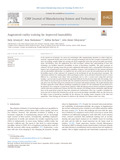JavaScript is disabled for your browser. Some features of this site may not work without it.
| dc.contributor.author | Ariansyah, Dedy | |
| dc.contributor.author | Pardamean, Bens | |
| dc.contributor.author | Barbaro, Eddine | |
| dc.contributor.author | Erkoyuncu, John Ahmet | |
| dc.date.accessioned | 2024-04-03T13:22:23Z | |
| dc.date.available | 2024-04-03T13:22:23Z | |
| dc.date.issued | 2023-12-06 | |
| dc.identifier.citation | Ariansyah D, Pardamean B, Barbaro E, Erkoyuncu JA. (2024) Augmented reality training for improved learnability. CIRP Journal of Manufacturing Science and Technology, Volume 48, February 2024, pp. 19-27 | en_UK |
| dc.identifier.issn | 1755-5817 | |
| dc.identifier.uri | https://doi.org/10.1016/j.cirpj.2023.11.003 | |
| dc.identifier.uri | https://dspace.lib.cranfield.ac.uk/handle/1826/21128 | |
| dc.description.abstract | In the current era of Industry 4.0, many new technologies offer manufacturing industries to achieve high productivity. Augmented Reality (AR) is one of the emerging technologies that has been adopted in industries to aid users in acquiring complex skills and carrying out many complicated tasks such product assembly and maintenance. Nevertheless, most AR applications have been developed without clear understanding of how such technology can facilitate improved learnability in terms of knowledge reusability. This paper proposed an enhanced AR-based training system that provides multimodal information with a contextualized information to improve task comprehension and knowledge reusability compared with traditional AR that presents unimodal and decontextualized information. An empirical test was carried out to assess the task performance and the task learnability aspects of this enhanced AR compared to the traditional AR and the paper-based document. The experiment consisted of a training phase where participants carried out an electrical connection task of a sensor followed by a knowledge reuse phase where participants had to wire a second sensor using their previous training. A pre-test quiz was given before the experiment followed by the post-tests phase after the training. Post-tests consist of one post-test given directly after the experiment (short-term retention test) and a second post-test quiz given one week later (long-term retention test) to measure information retention. The results indicated that AR-based approaches could enhance knowledge acquisition by around 18 % for traditional AR and almost 25 % for enhanced AR as compared to paper-based approach. While all training systems achieved relatively equivalent well for short-term retention test, trainees who used the enhanced AR training systems statistically outperformed those in the paper-based group for long term retention test. Furthermore, there was a positive correlation between the score of short-term retention test and the score in the knowledge reusability which was also shown by the higher scores in knowledge reusability for the enhanced AR training system compared to the other two approaches. These findings are discussed in relation to the Industry 5.0′s human centric core value. | en_UK |
| dc.description.sponsorship | EPSRC: EP/R032718/1 | en_UK |
| dc.language.iso | en_UK | en_UK |
| dc.publisher | Elsevier | en_UK |
| dc.rights | Attribution 4.0 International | * |
| dc.rights.uri | http://creativecommons.org/licenses/by/4.0/ | * |
| dc.subject | Augmented Reality | en_UK |
| dc.subject | Learnability | en_UK |
| dc.subject | Training | en_UK |
| dc.subject | Industry 4.0 | en_UK |
| dc.subject | Industry 5.0 | en_UK |
| dc.title | Augmented reality training for improved learnability | en_UK |
| dc.type | Article | en_UK |
| dcterms.dateAccepted | 2023-11-02 | |
| dc.identifier.eissn | 1878-0016 |
Files in this item
The following license files are associated with this item:
This item appears in the following Collection(s)
-
Staff publications (SATM) [4399]

